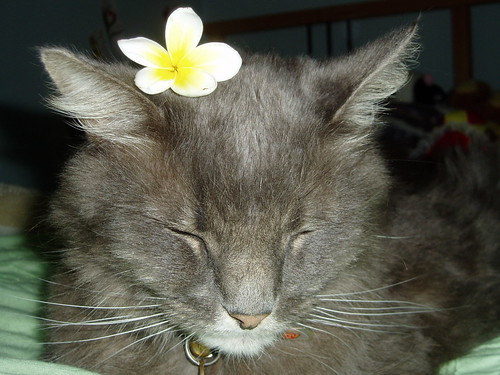Snakes Are Out And About
| Tweet |
So spring has finally sprung and we have been enjoying very beautiful sunny weather. I absolutely love the warmer and hot weather but this season keeps us vets much too busy to enjoy sun bathing.
Last week, snake bite season begun. It is a bit early but we definitely encountered a few snake bites and a few very close calls.
Snakes are out and about slithering away and looking for food & new mates.
Our first close call was with our regular patients ‘Molly’ & ‘Teddy Bear’. Their owner was walking them in the bush and suddenly her two border collies were barking at this massive brown snake. She did not see it strike but was not 100% sure so she made an excellent call and brought them straight to the clinic for close observation. We monitored them closely for over an hour to ensure they are in the clear. They were both very lucky and had been spared a venomous bite.

Teddy Bear just enjoyed every bit of attention coming his way.
I implore any person who has seen their pet in close contact with a snake to bring it straight into the closest vet clinic.
It is always better to be safe than sorry. Currently the snakes are quite venomous because they have just awoken from a long hibernation period and are ready to feed. Our first snake bitten patient, an 8-year-old kelpie, presented to us last Friday. The owners drove him straight down when they noticed he was wobbly and frothing at the mouth. He was aggressively treated and given two vials of antivenom and monitored intensely.
Unfortunately in spite of all our efforts, he did not pull through. Few hours later, we had a 4-year-old dalmatian brought in as she was seen salivating and acting funny and she was immediately treated and given antivenom and thankfully she survived. Today my colleague went out to a property to examine a miniature pony that was collapsed and she found it paralysed and before she could administer the antivenom, the poor little thing died.
The point I am trying to drill into you is if you notice your pet (cat, dog, horse, pony, donkey, cow or etc) walking like a drunk, salivating a lot or just acting funny, you must seek URGENT VET ATTENTION.
An animal usually presents with clinical signs of snake bite envenomation within half an hour of having been bitten but a few can take longer than that. The animals can vomit right after being bitten then they start to salivate and get very uncoordinated, wobbly and collapse. They have dilated and non responsive pupils. The longer you wait around for the clinical signs to become more apparent, the higher the chances are that we can’t save your pet. Act fast and take your pet to the vet. You need to bear in mind that treating your pet will cost money. They require iv fluids, antivenom (very expensive) and intensive monitoring!
You can easily rack up a $1000 vet bill. Each vial of antivenom costs between $300-600 depending on the brand and the type (combined versus single-tiger/brown combo or tiger or brown alone). Some pets require more than one vial of anti-venom to save them.
If you can’t afford treating your pet then at least get them to the vet to be humanely put to sleep.
No one wants their pet to suffer a horrible agonising death and that is exactly what you are doing when you let your pet succumb to the fate of their snake bite!
Cats are one of the most interesting creatures when it comes to snake bites.

Cats seem to have developed a coping strategy whereby they become very inactive after being bitten by a snake and slow down their metabolism to prevent the circulation of the anti-venom.
That is the reason we rarely get cats brought into the clinic when they have first been bitten unless they have been spotted playing with a live or dead snake. Cats love to parade their prey and they will often bring the snake home to show and tell. However most cats return home after having been bitten and isolate themselves and simply try to sleep it off. We usually get called by frantic owners who have just discovered their cats are paralyzed. We commonly refer to them as ‘plastic cats’ at the vet clinic.
The poor little fur balls can’t move a muscle and have lost their swallow reflex by the time they present to us. We always recommend starting them on IV fluids +/- antivenom based on the owners’ financial capabilities. I often find that without giving the antivenom, the owners end up paying the same amount of vet fees anyway because their cats require intensive hospitalization for a full week. This includes flipping the cats every few hours, lubricating their eyes, expressing their bladders and so forth. For those that get antivenom, they can respond very quickly and be discharged within a day or so.
Now the most popular question everyone wants answered:
‘What can I do to prevent snakes getting into my backyard?’
I do not have the answer to that and have done heaps of research that has proven there is no single method that will 100% guarantee that snakes will keep away. I have clients that have used every product known to man that is meant to ward off snakes and unfortunately have still been unsuccessful at preventing their dogs being bitten or in close contact with snakes. There are a myriad of products available that range from natural products (aimed at emanating smells that deter snakes) to electronic snake repellers (vibrations the keep snakes away) and so forth.
A backyard that contains compost bins (rodents for snakes to predate on) and lots of plants allowing for shelter are major attractants. Keep you backyard tidy and regularly ensure your compost is not infested with any rodents and that can reduce the likelihood of a snake visiting your premises.
It is important for me to also impart that snakes are living creatures that are an important part of the Australian Natural fauna.
They deserve to be alive and are protected species. They are not out there to get you, if anything, they are more scared of us than we are of them! As the human population keeps multiplying and we take over more of the available habitat, we simply need to learn to share the environment with its native creatures. If you spot a snake, get your pets into the house, keep away from the snake yet track its movements and call wildlife so they can organise a snake catcher to safely relocate it. I am not asking you to cuddle the snake and make friends with it but you need to respect this glorious creature that has every right to co-exist with us.
Be alert, act fast and don’t panic if you encounter a snake. If your pet is exhibiting any of the symptoms discussed, drag it to the closest vet as this is a true emergency!
Every minute counts and I have lost patients to snake bites that I may have saved had they arrived a few minutes earlier…
Related articles
Slithering snake (rayyathevet.com)
Filed under: Emergency Cats, Emergency Dogs Tagged: acting funny, Antivenom, australia, Australian Natural fauna, border collies, brown alone, brown combo, bush, cat, close contact, collapse, collapsed, combined, cow, dalmatian, deter snakes, dilated, Dog, donkey, drunk, electronic snake repellers, emanating smells, expressing their bladders, flipping the cats, frothing at the mouth, hibernation, horse, hospitalization, humanely, intensive monitoring, Intravenous therapy, iv fluids, kelpie, lubricating their eyes, monitored intensely, non responsive pupils, parade their prey, paralysed, Pet, poison, pony, put to sleep, salivating, single-tiger, snake, Snakebite, snakes, Tiger, uncoordinated, venomous, venomous bite, vet check, vials, wobbly Source: http://rayyathevet.com/2011/09/19/snakes-are-out-and-about/
| Tweet |


Facebook Comments